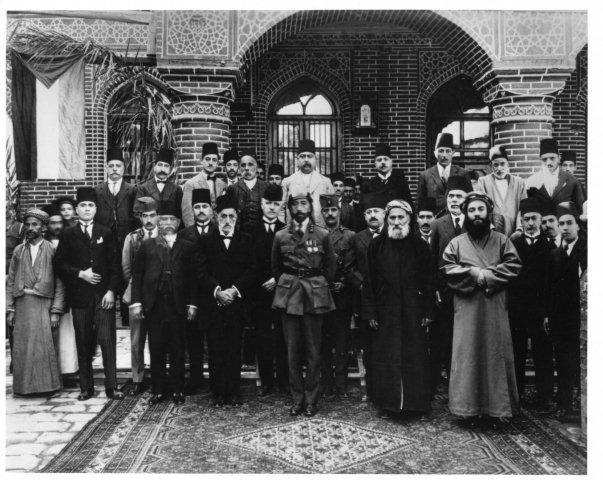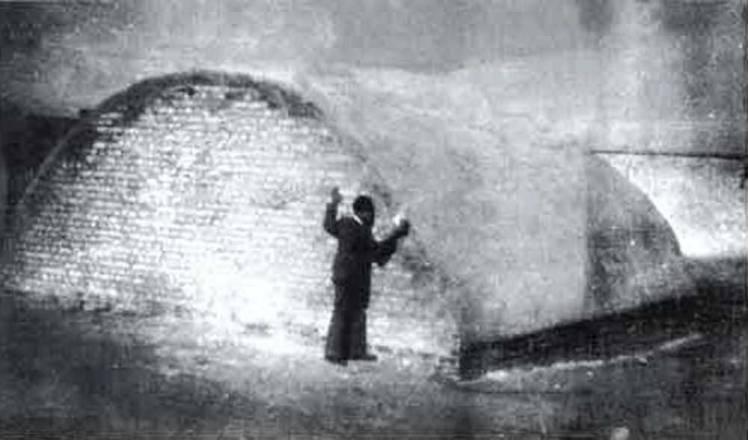
“If somebody wants to understand what is going on in the Middle East they have to understand the Jewish refugees from Arab countries” – Vivienne Roumani-Den (Former Refugee from Libya)
I’ve grown accustomed to the sheer surprise on people’s faces when I tell them that my parents are both Jewish and Iraqi. Yes, we exist. And so did Jewish communities in other Arab lands, the largest of which were in North Africa, but also notably in the Middle Eastern countries of Yemen and Syria. Jews living in Arab countries of the Middle East and North Africa once totaled 800,000. Today, with few exceptions, these communities no longer exist. Having previously taken some pleasure out of the surprised response I receive, I’ve now realised how incomplete an understanding of the Arab-Israeli conflict is, in the absence of the historical narrative of Jews from Arab lands and their descendants, who make up half of the Israeli electorate.
Having lived in ‘the West’ all of my life, the majority of people I encounter who have met Jews, tend to have met Jews of European descent, or Ashkenazim. Those who haven’t yet had the fortune of such an encounter, tend to presume an image of the European all the same. After all, we ‘Jews of Colour’ make up a minority of the Jewish population in Europe and North America, which is predominated by Ashkenazim. But this isn’t a strictly non-Jewish phenomenon. Throughout my time at the largest Jewish school in Europe, the surprised reaction, although less common, was still there. Our minority representation in the British Jewry made this ignorance an unquestioned given.
Until now, my family’s historical roots in Iraq, which date back over 2,500 years to the Babylonian period, have filled me with pride, but nothing more. My desire to learn about the history of Jews from the Arab world is motivated by a willingness to preserve my parents’ history, but I’ve felt no obligation to share it with anyone else. Living in the shadow of the Holocaust, the Farhud pogrom, the ‘Iraqi Kristallnacht‘ of 1941, which killed, raped, injured and stole from hundreds of Baghdadi Jews, may symbolise the darkest days of persecution for the Iraqi community, but it is just another pogrom in the history of world Jewry. The discriminatory laws and regulation across the Muslim world that intensified during the rise of Arab Nationalism and as a response to Zionism, are reminiscent of the Nuremberg Laws in Nazi Germany, but lack the horrors of the Final Solution that followed them, to put the story of the Jewish experience in Arab lands within the discussion of historical anti-Semitism.

Zionism, was a political ideology that emerged from Europe in a climate of state nationalism and as a response to European anti-Semitism. However, whilst the majority of Jewish settlers in historical Palestine were European, none of them had endured the horrors of the Holocaust. Although this unforgettable chapter in European history served to convince world Jewry of Zionism’s necessity to the Jewish people’s survival, it was in no way a motivating factor for the origins of the project. These early state builders, predominately composed of secular socialists, were not only free of the scars that the Holocaust left on the mentality of survivors that later emigrated to Israel, but also had no historical relationship with Arabs or Muslims. In contrast, Jews emigrating from Arab lands had developed mistrust, fear and resentment of Arabs and Muslims after living as second-class citizens in Arab countries since the birth of Islam, and in some cases, for even longer.
After almost 30 years of political domination in the State of Israel, shaping its institutions and national identity, the socialist Zionists lost their political dominance to the right-wing party of Likud. Israeli politics would never be the same again. Since the 1977 breakthrough election, the political discourse and culture in Israel has become more nationalist, less sympathetic to Palestinian Arabs and gained renewed Zionist aspirations. Electoral analysts over the years have considered many factors of Likud’s rise to power, but all agree on the single largest contributing factor. It wasn’t the existential threat posed by Arab countries throughout early statehood. It wasn’t an economic dissatisfaction with a lack of free enterprise under the socialists. And it certainly wasn’t the experiences of the Holocaust that justified a subtle exclusion of Arabs from the distinctly Jewish nationality. It was the vote of Jews from Arab countries.
Whilst the state was built by secular European socialists, the mass immigration of traditional Jews from Arab countries meant that these early Zionists became outnumbered by a group that had recently experienced intensified persecution. Of course, a whole range of factors contributed to the decision to support Likud. But the most fundamental, and yet most overlooked factor is the shared historical narrative of the ‘ethnic’ electorate which swung the election and has shifted Israeli political discourse further right ever since. Although anti-Arab sentiment may not be at the forefront of voters’ minds, their experiences in Arab countries has a profound impact on their trust, sympathies and attitudes towards Palestinians and Arab Israelis, who are seen in many ways as the same enemy. What’s more, the politicisation of anti-Zionist and anti-Semitic sentiments within Islam, intensified a fear and distrust of Muslims – a fear perpetuated by continued anti-Semitism in parts of the Muslim world, and just over the border by Hamas in Gaza. The fact that this ethnic group make up half of the Israeli electorate, and have at points outnumbered their European counterparts, makes this shared historical narrative a fundamental characteristic of the Israeli psyche.

Admittedly, the fact that the history of Jews from Arab countries is not discussed as much as the Holocaust, undermines its importance in the current Israeli political culture. Nevertheless, the fact that voting behaviour was so strongly correlated for so long to ethnicity shows a commonality shared between Jews of the Middle East and North Africa. More important than their shared cultural, religious and political traditions, is their shared experience of discrimination and persecution in Arab lands which often dictates their feelings towards Arabs, and influences their opinions on the Arab-Israeli conflict. Although their descendants do not directly share the personal and traumatic experiences with Arabs that have scarred their parents, the damage has been done. When Likud’s nationalist message grew stronger, their left-wing opponents followed, taking the whole national discourse with them. The right-wing nationalist, unsympathetic and mistrusting nature of this political shift has become a permanent fixture in Israeli politics. Further violence, aggravation and friction between Jews and Arabs since, have meant that this fear and mistrust of Arabs has permeated all corners of Israeli society: secular and religious, Mizrahi and Ashkenazi, liberal and socialist, expansionist and conciliatory.
So what’s the point of discussing the hardships suffered by the forgotten Jews of Arab countries? Well, I believe that hatred cannot come out of nothing. Fear, mistrust and resentment may be manipulated for political gains, but always has a rational grounding in some perceived form of reality. In the context of Israel, the actual history of the Jews from Arab countries does not matter as much as the narrative itself. That narrative is one of persecution, violence and mistrust at the hands of Arabs and Muslims, who they see as the same enemy that Israel fights today. Does this mistrust and resentment justify any violent, aggressive or non-conciliatory action? Of course not. But in the same way that you can look at the violent resistance of Palestinians as a response to Israeli occupation and their historical narrative regarding Israel and Zionism, perhaps we can look at the Arab persecution and the Muslim discrimination of Jews in Arab countries as a reason why the Israeli population is overwhelmingly supporting an Israeli soldier’s extrajudicial execution of an incapacitated Palestinian attacker, and why the Prime Minister referring to Arabs as ‘wild beasts’ can go with heads unturned.
Calling the Arab-Israeli conflict a ‘complex’ one is both cliché and overstated. But the often ignored history of the forgotten Jews of Arab countries plays a huge role in complicating Jewish relations with Arabs, particularly inside Israel where half of the electorate descends from Arab lands.
Reblogged this on Autumn leaves.
LikeLike
You’re right that there should be a greater awareness of those Israeli Jews who have Arabic ancestry; of the history of Jews in Arab countries; of the ethnic cleansing / flight of Jews from Arabic countries in the late 40s – 50s; and of the relevance of all this to the current political situation in Israel. I don’t think you are going to achieve any significant kind of understanding with this piece, though. For all that this blog purports to think philosophically, there’s not much of that going on here. For one, the title – itself a cliche – makes a number of dubious assumptions: one, that there are people out there who are trying to understand Israel, rather than (say) consolidate a view or an emotional attachment to a view they already have; two, that any gain in understanding will have any meaningful effect on what those people actually do; three, that the facts, at least in general outline, about Israel-Jews’ ethnic diversity are not known among constituencies involved in Israeli-Palestinian discourse; four, that the kind of people you seek to influence here are amenable to these kinds of arguments. Assumption three is perhaps the most valid – but if you’re going to test it, you need a better strategy, because all the other assumptions are weak.
If you have an impact on other people because you are both Jewish and Arabic, it is because you can do it in person. What’s conspicuously lacking here is the kind of detail, perhaps drawing on your own family’s history, that would make it interesting, really interesting, moving, as opposed to blandly, and at times offensively, rhetorical. When you say “the actual history of the Jews from Arab countries does not matter as much as the narrative itself” you seem oblivious to the fact that your piece reinforces that narrative – in its tacit legitimizing of authentic / direct, as opposed to orchestrated/ political hatred, as if the two could be so cleanly separated; in the constant reiteration of stock phraseology (“mistrust, fear and resentment”; “fear and distrust of Muslims” ; “unsympathetic and mistrusting nature of this political shift” “fear and mistrust”; “fear, mistrust and resentment”; “persecution, violence and mistrust”; “mistrust and resentment”); in the way in which you swoop, in the most unphilosophical way possible, to hammer down the few shards breaking off from this narrative (“although their descendants do not directly share the personal and traumatic experiences with Arabs that have scarred their parents, the damage has been done)”.
The last line – in which you acknowledge that attributing complexity to the conflict may be a cliche, but is a justifiable one – is doubly ironic, given that this blog is likely (whatever your intentions) to secure, rather than disturb, the worldview of people who already agree with you (and about such glib simplicities as your description of Jews’ experience in Arab countries), and that you spend the entire piece iterating one stale trope after another (and sometimes the same one lots of times).
Much of what you seem to hang on a kind of inevitable logic of history – which, once exposed, what? – would, needless to say, be found abhorrent if we were talking about Palestinian racism / violence. Most of the actors in the current conflict have trauma in their experience or their ancestors’.
LikeLike
Hi josephtiman,
I can understand your way of thinking about this but I would like to share a theory of my own…
Today is the Holocaust memorial day in Israel, and as always the Farhud progroms won’t take a place as an important event in the ceremonies across the country. If it will be mentioned at all…
Sometimes I feel like the “Jews from Arab Countries” are left behind. Last year it was the first time the Farhud Survivors got Official Compensation from the goverment! (That done after a lot of them already passed away…).
As a 3rd generation to Iragi jews, and a student in Jerusalem I encounter the so called “israel-palestine conflict” in a different way. I do share some similar opinions as my parents about politics but it is way more open to talk about the conflict freely this days. It’s so opposite, that to have a “zionist” opinion today might get you scared to say what’s on your mind(At list that’s how I feel).
I can relate with the Arabic culture way more than the “Eshkenazy Mainstream”. Even if it might be risky I can just enter a palestinian shop in jerusalem, eat falafel and talk to them about politics. We do that sometimes, I think we have a lot in common. And they have awsome tea!
I think the jews from iraq and luv and yamen etc will always have a problem with the muslims not just because their bad experiences there… But because the Arabs in those countries won’t acknowledge or apologized for their actions back those days…
A jew can walk freely in Berlin. Visit the home they had in Varsha. See the monuments of the events everywhere… The german people are openly aware to what happend and take part in the memorial!
My grandmother will never be able to go back to Iraq… Being a jew in Arab country is luck! (Or a Miracle).
Until the Muslim extremists will accept the Jewish religion this conflict won’t have an end.
In the meantime, good arab people in iraq volnteer to take pictures of old jewish houses there and post it on facebook for us to see 🙂
LikeLike